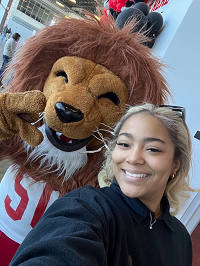23nov
EMCC’S UTILITY LINEWORKER PROGRAM PROVES POPULAR
News
November 23, 2020
Amory resident Michael Pickle enjoys traveling and being outdoors. He wants a career
that fits his interests. After exploring his options, Pickle enrolled in East Mississippi
Community College’s Utility Lineworker Technology program, which prepares students
for an entry level apprenticeship at a utility company, a co-op or a contractor in
the utility construction or excavation fields.
“I love it,” Pickle said of the program. “I am ready to go to work.”
Utility Lineworker Technology is a 16-week program offered on EMCC’s Scooba campus.
Graduates receive certification in pole climbing, CPR and first aid, forklift operation
and OSHA 10-hour safety training.
“Safety is a big, big part of everything we do,” said Utility Lineworker Technology
instructor Chuck Cotton, who assumed the position in March after longtime instructor
Doyle Perkins retired. “We teach them the basics of linework: how to climb and how
to frame a (power) pole, which is installing the crossarms and other materials that
go on the pole.”
That training includes instruction in the fundamentals of electricity, AC/DC circuits,
mathematics and Rural Utilities Specifications.
While the students learn how to operate bucket trucks, a bigger emphasis is placed
on teaching them to safely climb power poles to perform needed work.
“They have to know how to climb,” Cotton said. “If you have 5,000 people without power
and work is needed on poles located in a place where you can’t get that truck to,
they have to know how to do that.”
That training takes place on a series of power poles set up on EMCC property. The
poles are for training purposes only and the transmission wires do not have electricity
flowing through them.
Students also receive instruction needed to earn a Class A CDL, or commercial driver’s
license.
“Utility co-ops and places that hire these guys want them to have their CDLs because
they have some big trucks and during an emergency situation they want them to be able
to drive anything they have, including pole trucks,” Cotton said.
That training is taught by Commercial Truck Driving instructor Kevin Rushing.
“The Class A CDL is the top license you can get,” Rushing said. “Once they get their
Class A they can drive any air-brake vehicle, including those with manual transmissions.”
Students are taught to drive, back, shift and stop commercial trucks using EMCC equipment
and Rushing accompanies them when they go to take their commercial truck driving road
test.
“The good thing for the students is once they get their CDL, they have something to
fall back on and can always go drive a truck after they get a little experience,”
Rushing said.
Right now, Utility Lineworker and Commercial Truck Driving are taught in tandem, but
plans are in the works to offer CDL training separately on the Scooba campus so students
waiting to enroll in the Utility Lineworker program can go ahead and take the driving
component. EMCC already has a CDL program on the college’s Golden Triangle campus.
The Utility Lineworker program has proved popular. The spring 2021 class that begins
in January is full, but students can enroll now for the fall term.
Graduates who land apprenticeships can expect to undergo on-the-job training for four
to five years before they are qualified to become journeyman lineman. For those who
complete the training, the field can be rewarding. According to the U.S. Bureau of
Labor Statistics, the 2019 median pay for linemen was $65,700 a year.
“In addition to our many academic and career technical programs that lead to a two-year
degree, we also have short-term training in areas like the Utility Lineworker program
that can lead to really good careers,” EMCC Interim Associate Dean of Instruction/Division
Chairperson, Mathematics and Science Dr. Jairus Johnson said. “We are here to help
members of the community we serve reach their educational and career goals no matter
what that might be.”
For more information about the Utility Lineworker Technology program, call Cotton
at 662.476.5105 or email him at ccotton@eastms.edu, or call Renyetta Johnson at 662.476.5088
or email her at rjohnson@eastms.edu.




 Visit a Campus
Visit a Campus





